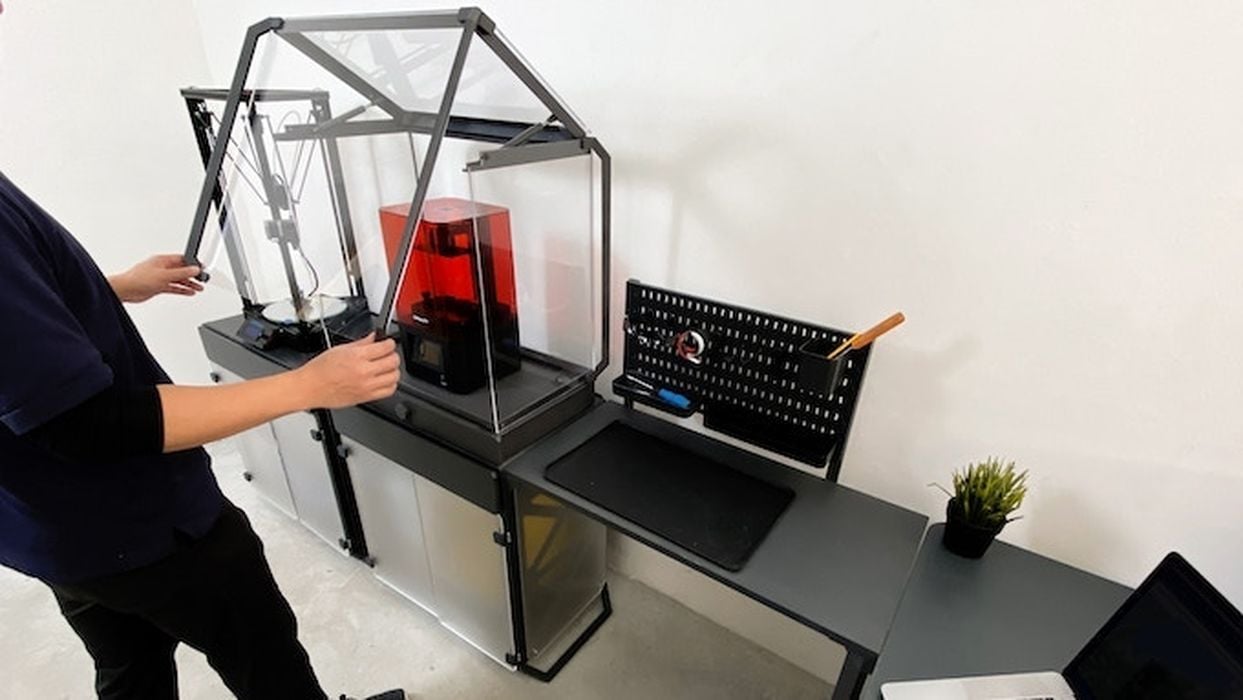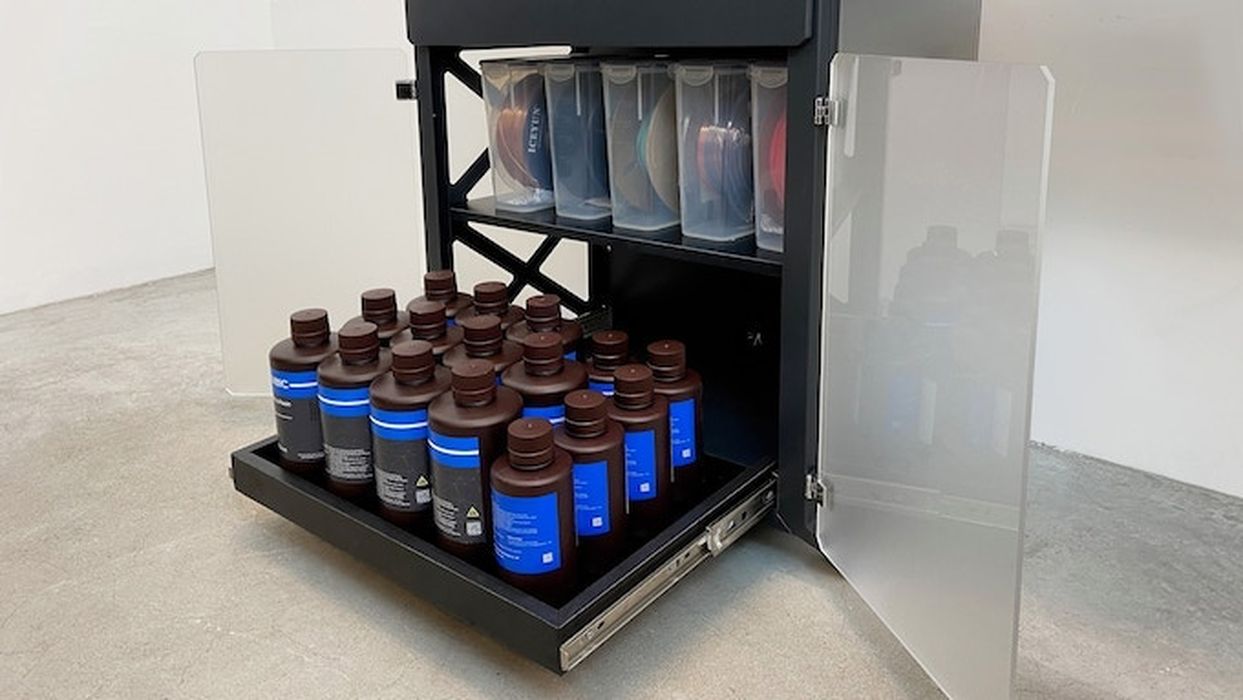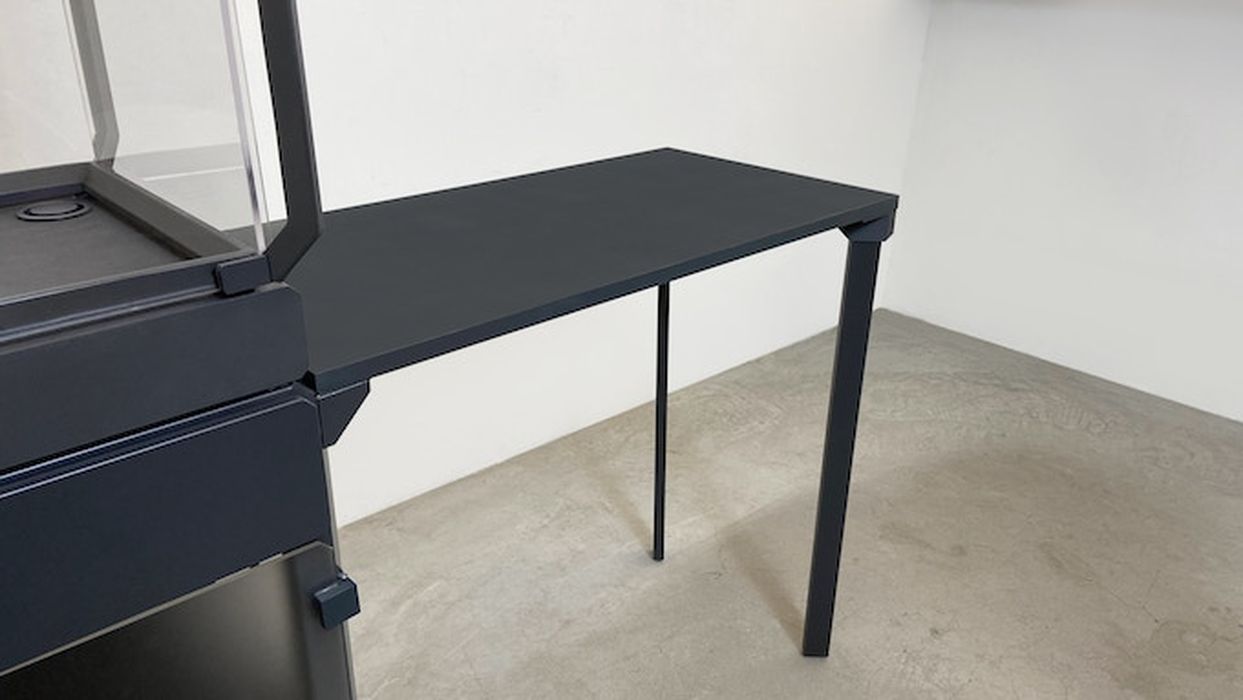
A new furniture option is set to shake up the resin 3D printer world.
When heated, FFF 3D printers are known to emit nanoparticles and VOCs (volatile organic compounds, usually very bad for you.) To counteract these negative effects, manufacturers have developed a series of standalone enclosures for capturing and filtering out the particles and VOCs.
Those are great solutions, but what about resin 3D printers? These increasingly popular devices are far, far worse for toxicity than any FFF device. Resins can produce reactions if an individual has had a sufficient exposure to them. That’s why resin 3D printer operators absolutely must wear PPE each time they interact with the system. Nitrile gloves, sleeves, safety glasses, etc., all must be used.
Even so, resin can emit particles into the air. That’s the toxic odor you smell when the resin bottle is opened. As you breathe it in, you’re gaining exposure, just not as much as from direct skin touch.
This is why we and others strongly recommend external ventilation, or if that cannot be done, using a sophisticated filtering system to capture the bad stuff before you breathe it in.
Somehow, no one has built a successful enclosure system for resin 3D printers — until now.
PrintStation MK2 Enclosure
Guangzhou Jianpai Steel Manufacturing Co. has developed the PrintStation MK2, which does exactly that. PrintStation MK2, it also works for FFF devices, but its pioneering efforts on the resin environment are most welcome.
As you can see in the visuals, it is a completely enclosed system, and entirely see-through. This is an important feature because operators should be able to observe the entire machine during print jobs, and because many devices are supported, you don’t know which viewing angle could be required.
The interior space is filtered with an advanced filtration design that includes three stages:
- Coconut activated carbon to remove formaldehyde
- Cado blue activated carbon to remove VOCs
- Silver ion HEPA to remove small particles
This is the most sophisticated filtration design I’ve seen on a dedicated 3D print system. The manufacturer explains:
“The filter used in PrintStation MK2 is perfect for 3D printing, it catches ultrafine particles and VOCs. It can remove odor, VOC, HCHO and 99.97% of PM particles down to 0.09 microns in size. The filter can be used up to 3 months/ 600 hours print time and costs only USD10 each”
It also looks like it is a very simple matter to swap filters.
The MK2 is also set up to vent externally, should there be a connection possible.
The MK2 seems large, and it is in order to accommodate machines of different dimensions. They’ve also designed the door to be very large for this reason. I quite like the way the door works: it opens upwards, meaning it won’t get in the way of hauling machines in and out of the chamber, and also takes up less floor footprint.
The MK2 also has “temperature control”, which apparently can maintain the temperature inside the chamber up to 40C. It’s not clear where the heat is coming from, whether it is simply residual heat from the 3D printer itself, or if there is a heating element in the MK2.
Nevertheless, warmer resin is always better because it makes it less viscous and easier to flow between layers. In other words, hot resin equals more reliable prints.
Fire Safety

One thing we don’t see on the MK2 is a fire detection system, something that often appears on FFF enclosure systems. This is because resin 3D printers don’t have a heating system and are never going to catch on fire. This should be kept in mind if one intends on using the MK2 for a FFF 3D printer.
In addition to the enclosure itself, there are couple of interesting options. One is PrintStation Storage, which is a cabinet on which the enclosure sits. Inside the storage unit are shelves to store supplies and tools. From the images shown, it looks like one shelf could hold up to 16 one-liter bottles of resin, and that’s a lot of resin.

In addition there is a work table extension where an operator could perform the messy steps of post processing. On top of this table is a pegboard-style backing on which tools can be mounted for easy access.
Putting all this together you’d have a very nice resin 3D printing workstation.
Missing Features
There is one aspect that seems to be forgotten, however: post processing. This involves washers and UV light units, which might fit on the extension table. However, the washer in particular is also a major source of odor and emissions and likely deserves its own filtration enclosure.
When post processing there is a tendency to create messes as prints can be drippy. It would be nice to see some kind of safe surface for doing this work, able to be easily cleaned and stop drips from traveling far. They do offer a silicone mat, however, which could do this job.
The PrintStation MK2 looks to be a very useful furniture addition for resin 3D printer operators. However, it may be a bit pricey when you start adding it all up. Here’s the breakdown (in MSRP non-discounted prices):
- Enclosure: US$400
- Extra filters: US$60
- Storage: US$500
- Table: US$100
- Pegboard: US$40
- Mat: US$25
- Shipping to USA, full set: US$130
Total: US$1255!
That total is about US$1000 more than today’s inexpensive resin 3D printers, for reference.
The good news is that all of these are offered in the current Kickstarter campaign at discount and bundle pricing. For example, you can get the “full set” for only US$785, plus shipping, which is a much more reasonable price.
Kickstarter Risks
As this is a Kickstarter campaign we should comment on the risks of participating. In many cases in the past 3D printer manufacturers have failed to deliver their products to backers for a variety of reasons. Most of these have to do with supply or financial mismanagement due to inexperience.
Here we have a different story. Guangzhou Jianpai Steel Manufacturing Co. is a well-established manufacturer with a long track record, including previous 3D products. In addition, the nature of this product is straightforward, meaning they are unlikely to be stymied by supply issues for fancy chipsets, for example.
If you’re using a resin 3D printer in a place occupied by humans, you might want to check out this product.
Via Kickstarter
